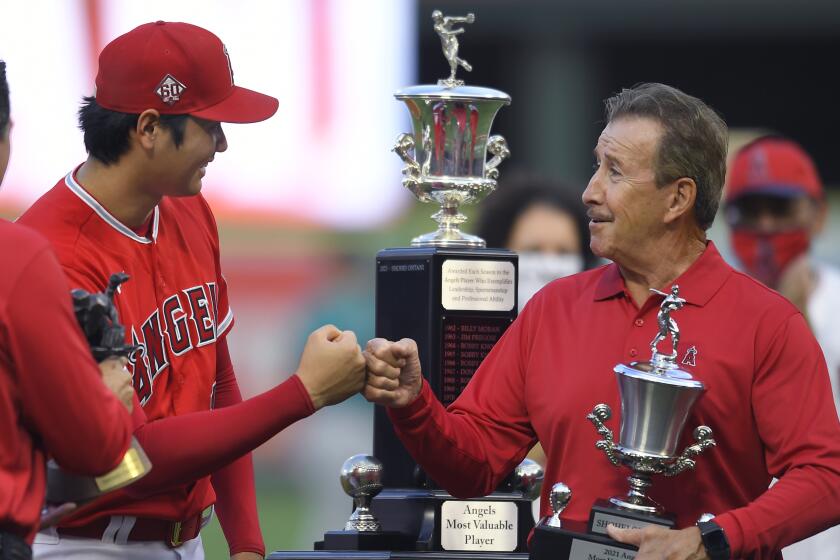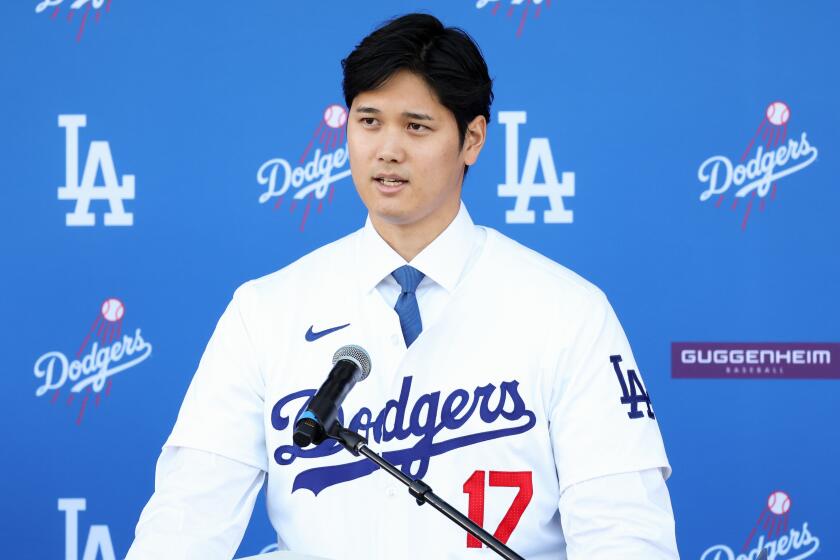Patch work, field work: How Dodgers could make Shohei Ohtani’s contract pay for itself
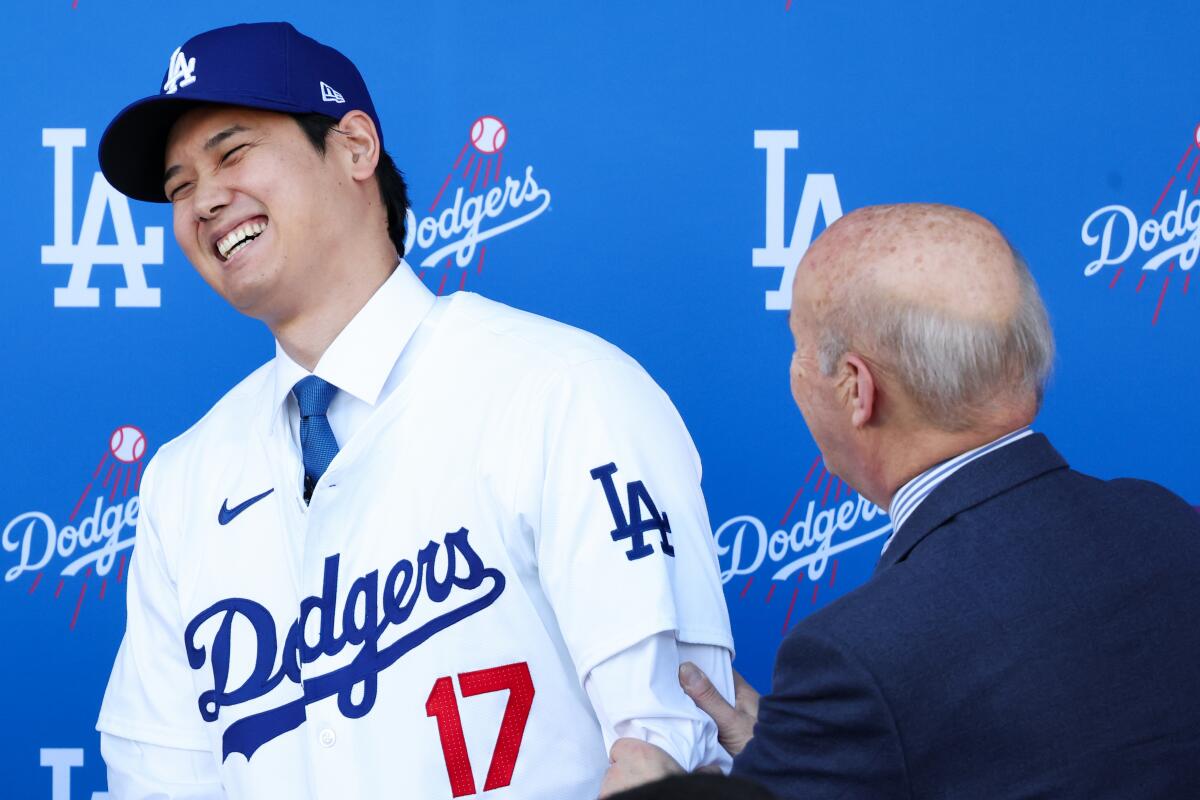
- Share via
Could the Dodgers really sign Shohei Ohtani to the richest contract in baseball history and still make money on the deal?
Stan Kasten smiled. After the Dodgers introduced Ohtani at a news conference Thursday, the Dodgers’ president declined to dispel the notion that Ohtani’s contract could pay for itself.
“I think this was a good deal for the Dodgers,” Kasten said, “on the field and off the field.”
The Dodgers’ legacy in Japan dates back decades, to the team playing exhibitions there under O’Malley family ownership, and to All-Star pitcher Hideo Nomo.
Shohei Ohtani, who repeatedly praised the Angels on Thursday, gave his former team multiple chances to counter the Dodgers’ offer he ultimately accepted.
“Combining the most popular international player in the world with the Dodgers’ brand is going to expand that,” Kasten said. “That is going to be good for baseball, and it is going to be very good for the Dodgers.”
Let us count the ways.
The Ohtani jerseys are flying off the shelves, even the virtual shelves, for as much as $346.99 per jersey. The Dodgers are making a killing on this, right?
No. The revenue from licensed merchandise — jerseys, T-shirts, caps and so on — is split equally among the 30 major league teams, so the Angels get the same cut as the Dodgers from the sale of Ohtani jerseys. (The exception: The Dodgers get a greater share of revenue for sales at Dodger Stadium and at Dodgers Clubhouse stores in Southern California and Las Vegas.)
Everyone wants to watch Ohtani, especially in Japan. The Dodgers will cash in on selling television rights to broadcasters in Japan, right?
Again, no. Major League Baseball controls international broadcast rights and splits the revenue equally among the 30 teams.
Am I going to be able to afford to take my family to a game at Dodger Stadium now?

The Dodgers, like many teams, use dynamic pricing — that is, adjusting ticket prices up and down based on demand, rather than setting a price for each ticket and sticking with it all season. The more people that want to see Ohtani play, the more expensive a ticket is likely to cost.
“I think we have a good record here of matching supply and demand at price points across a wide range of budgets,” Kasten said. “That won’t change.”
Within hours of Thursday’s news conference, the Dodgers emailed fans, saying “It’s Sho Time” and offering dugout club seating for as much as $111,840 per seat this season. After Ohtani announced he would sign the Dodgers last weekend, standing-room tickets for the home opener were available for almost $900.
But the opportunity for the Dodgers to cash in on ticket sales is limited by the fact that they sell so many tickets already. The Dodgers played to close to 90% of capacity in the largest stadium in the majors last season. It is not as if they can now double their attendance.
Shohei Ohtani’s dog stole the show during his American League MVP announcement last month. The new Dodgers star revealed the dog’s name on Thursday.
The Dodgers could make more in ticket and merchandise revenue, one former MLB business executive told The Times, “but it’s pennies compared to sponsorship. It’s all sponsorship.”
What does that mean?
“There will be lots of Japanese companies — and American companies that sell things to Japan — that are going to use the Dodgers and Dodger Stadium to promote themselves,” said Marc Ganis, president of Chicago-based Sportscorp Ltd.
The first and most obvious sales pitch: jersey patches.
“This may be precisely the thing that appeals either to a high-end company, or a Japanese company that is not well-known,” Ganis said. “This would certainly put them on the map.”
The Lakers and New York Yankees each sold jersey patch sponsorships for about $25 million per year. With Ohtani, the Dodgers might be able to do that too.
The Dodgers have one other major sponsorship opportunity available. What is it?
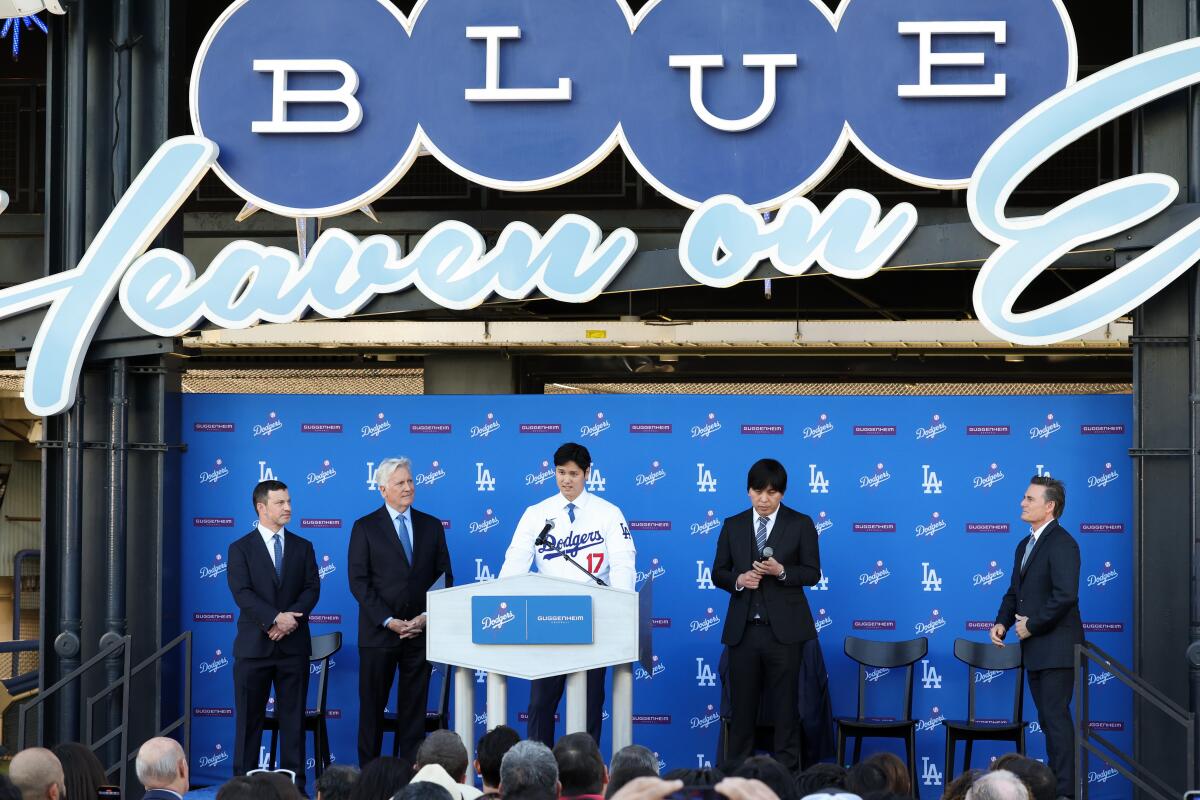
Field naming rights, which they have tried to sell for years. Instead of playing at Dodger Stadium, the team could play at — by way of example — Honda Field at Dodger Stadium.
No one would expect fans in Los Angeles to call the ballpark anything but Dodger Stadium, but audiences in Japan and the United States would see the corporate name behind home plate — every pitch, every home game, every season.
In 2017, the Dodgers asked $12 million per season in field naming rights. With Ohtani, they could seek $20 million, or more.
“They are in a unique position in the marketplace with their sponsorship portfolio,” said Jeff Marks, president of Los Angeles-based Innovative Partnerships Group. “Having both the jersey patch and the field naming rights available now allows them to unlock value and put a premium on two high-value assets they have never sold.”
The two-way superstar speaks to the media for the first time since signing with the Dodgers.
So, with those two sponsorships, the Dodgers could just about make back the $46-million annual value of Ohtani’s contract. Would there be other money-making opportunities?
Sure. The Angels did not sell field naming rights, and their modest jersey patch deal last season was sold to a local building supply company, largely because no one could promise Ohtani would stay in Anaheim beyond the season. Still, the Angels made $10 million to $20 million per year on Ohtani-related sponsorships, and the Dodgers could make more — on new sponsorships, and on increased renewal rates as current sponsorship deals expire.
The banner behind Ohtani on Thursday included a logo for Guggenheim Baseball, the Dodgers’ ownership group. If the price is right, a corporate logo could replace the Guggenheim one, visible during Ohtani’s interviews.
And, since MLB rules require the Dodgers to set aside $46 million of deferred money each year, the team could invest it with Guggenheim Partners, the financial services firm run by team chairman Mark Walter. The firm manages nearly $300 billion in investments; the Dodgers could profit by investing the pool of deferred money with the firm.
The Dodgers have $850 million in deferred payments owed to Ohtani, Mookie Betts and Freddie Freeman. Could Walter just sell the team and cash out?
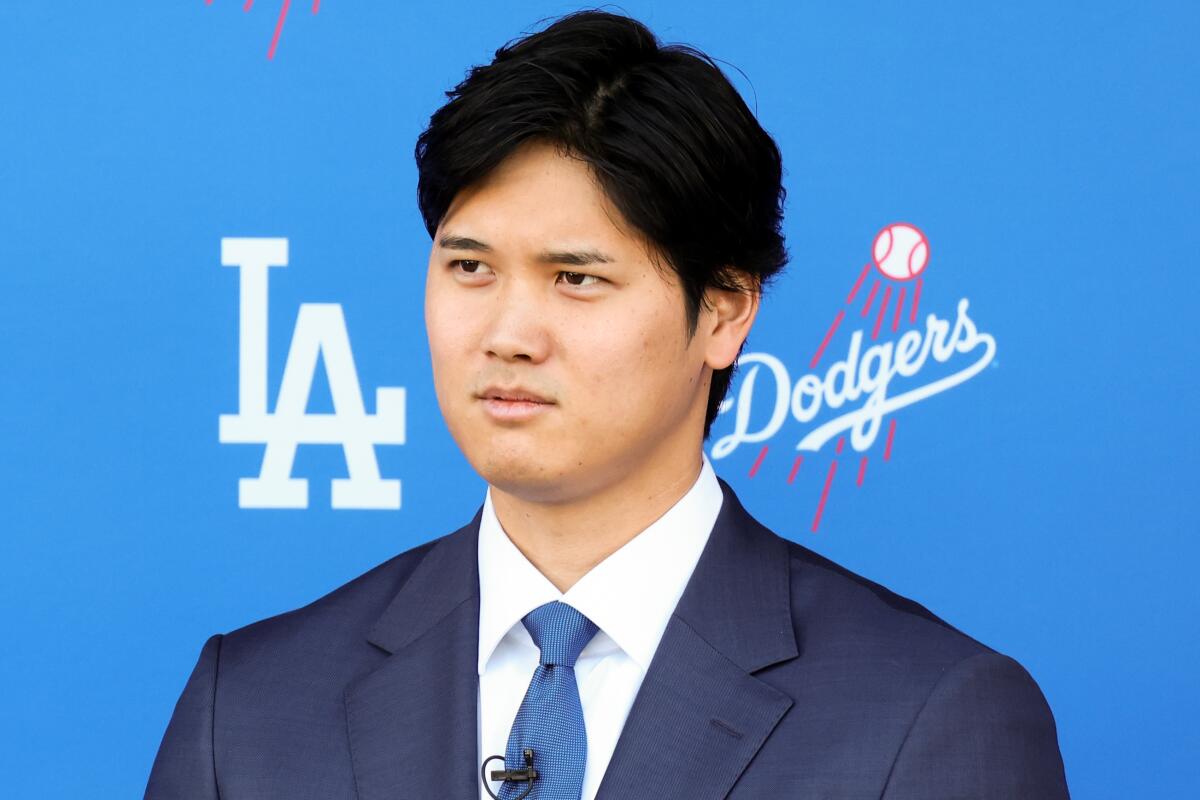
“That is not the plan,” Kasten said.
As the value of the team rises, Walter could sell part of the team and cash in.
During Thursday’s news conference, Dodgers president of baseball operations Andrew Friedman said: “One of our goals is to have baseball fans in Japan convert to Dodger blue.”
That could turn the Dodgers brand into a powerhouse at home and abroad.
“Right now, you go around the world, and what you see are New York Yankee caps,” Ganis said. “We might start seeing the L.A. logo appearing a lot more around the world, particularly in Japan and Korea.”
How convenient: Ohtani and the Dodgers open the 2024 season against the San Diego Padres on March 20 — in Seoul.
Shohei Ohtani, baseball’s top free agent, agrees to a $700-million deal with the Dodgers. Here’s everything you need to know about Ohtani joining the Dodgers.
Sportico last year valued the Dodgers at $5.2 billion — pre-Ohtani, that is. Even at that value, the Dodgers could sell 5% of the team for $260 million, or more than half of Ohtani’s contract, to a minority owner or investment fund.
On Thursday, the Dodgers reserved a front-row seat — right next to general manager Brandon Gomes — for one of their current minority owners.
They also reserved 20 prime seats for the department charged with executing the new business plan: Global Partnerships.
More to Read
Are you a true-blue fan?
Get our Dodgers Dugout newsletter for insights, news and much more.
You may occasionally receive promotional content from the Los Angeles Times.

